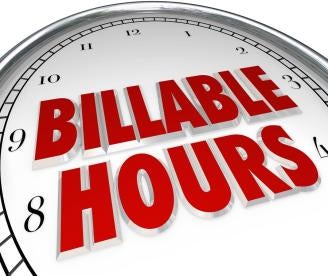What does it take to get ahead in your new profession as an attorney? Perhaps the most outstanding item on your to-do list as a law firm associate is to understand that it is a business. What your firm is selling is time – your time and your colleagues’ time.
Most attorney jobs require you to record your billable hours and some even require you to keep track of your non-billable hours. It’s all in the name of the business and generating revenue.
A great article to read is “The BCG Attorney Search Guide to Basic Law Firm Economics and the Billable Hour: What Every Attorney Needs to Understand to Get Ahead.” It gives the real low down on the business of law. A synopsis of the guide is offered forthwith.
Generally speaking, as a brand new law firm associate, you aren’t expected to be a rainmaker unless you are employed by a small law firm. For the large to medium firms, you are a worker bee; your job is to work on case matters. The author puts it quite succinctly:
“Here’s how the business of law works. As a general rule, partners attract clients to the firm. When you, as a new associate, do work for those clients, the hours that you put on your time sheets generate reports, which generate bills, which generate revenue, which in turn pay overheads, associate salaries, and profits to the partners.”
During this time, you are said to be on a partnership track. If you stay on with your law firm, the partnership opportunity could go one of two ways. You could become an equity partner or a non-equity partner. There is also an unfortunate third way, in which you may be notified that you will not be asked to be a partner at all. Most law firms give ample warning if this is to be the case so that you can either find other employment or hone your skills.
An equity partnership is usually reserved for those who are attorney rainmakers for the firm. These are people who fully understand that law firms are businesses and must generate revenue. And equity partner owns part of the business and is entitled to part of the profits. Before you can become an equity partner, you will be required to purchase your share.
A non-equity partner is an attorney who is considered valuable to the firm but isn’t very skilled at rainmaking. (S)he won’t own a piece of the practice but will enjoy job security and some managerial functions.
Law Firm Economics
According to the guide, there are five messages that you should take away from this business model:
- As in all businesses, the people who bring in the work are worth more than the people who do the work.
Bringing in the cash is what will rocket you to the top. You will also earn a bit of autonomy over your schedule because you will have your own clients. Furthermore, because you will have a solid book of business, if you ever become inclined to leave your firm, you will be able to do so. It’s important to watch your more successful law firm associates and follow their styles of doing business. The key is to pay attention and be financially independent as you work your job. - Your firm has to make money on you to justify what they pay you – sooner rather than later.
When you are searching for a job as an attorney, be aware that the firm will seek to get a great return on their investment in you. This usually means that the higher the salary that law firms are offering, the more they will expect from you in terms of billable hours. - It’s important that you understand from the start what’s expected of you in terms of business generation, and that you’re comfortable with that.
If you are working for a small law firm, you will be expected to generate business. According to the guide, there are two ways to do this: “Either bring in new clients or get additional work from clients you already have.” To find new clients, visit meetings and other gatherings of bankers, real estate brokers, investment companies, and other businesses that serve people who will need lawyers. To get additional work from current clients, cross-market. Your banker might need an attorney for his son’s car crash, for instance. - Billable hours count more than non-billables, no matter what the party line is.
Obviously, billable hours are more valuable than non-billable hours. However, you are still going to have plenty of non-billable activities to fill your day. While you should fulfill your non-billable activities, don’t get swept away with them, advises the guide. For example, if your firm requires a law firm associate to donate 50 hours a month to the indigent, don’t put in 150 hours.
There are always other options.
There are several jobs available that require a law degree yet don’t require you to be an attorney, such as law firm administration, politics, legal publishing and journalism, higher education, financial planning, investment banking, or estate planning. Furthermore, law firms aren’t the only organizations hiring. You could go the route of government jobs, public interest employment, in-house, or find a judicial clerkship. You can even hang out a shingle.
Handling Billable Hours Issues
- Clarify what’s expected of you up front
Law firms have billable targets toward which you should strive. If you don’t know your billable target, by all means: ask! To reach your goal, it is helpful to break down your yearly target into bite-sized chunks, like how many hours you should bill in a month, a week, a day. Stick to your mini-targets! Always take care to over-calculate you target goals in case something unforeseen comes up during the year. - Find out up front what happens to the billable hours if clients don’t pay.
Sometimes the Law firm associate will take the hit, but partners may decide to split the losses with the associate. - Lunch isn’t billable. Recognize that every hour you spend physically present is not a billable hour!
A rule of thumb is that it’ll cost you between 10 or 12 hours to be able to bill 8 hours. If you’re falling short of your billable hours goal, get to work before anyone else gets there. This will leave a nice, uninterrupted span of time to work. - Keep track of your time with the ultimate goal in mind: Giving clients bills they’ll pay.
It is paramount that you keep up with your timesheets. This cannot be emphasized enough. You do not want to be reconstructing minutes that happened two weeks ago. - Keep track of every minute. Yes, it can a pain in the butt – unless you have the right practice management software. You’ll find billable time you never realized you had.
Record your time at least once every day. Don’t leave work until you have done this. If you can, record more than once a day. Some attorneys record their time right before lunch and again before leaving work. Along these same lines, be a law firm associate who turns in her timesheet on time. The staff will love you for it and you’ll gain a good reputation. - Don’t mark it up, don’t mark it down—just record it … but be aware of the hidden importance of efficiency.
As a law firm associate just starting out, it’s not unlikely that you will feel that it’s taking forever to carry out an assignment and you may feel reticent about entering all the time that you spent on it. Record all the time it took anyway. If you feel that it’s taking more time than you or your supervisor thinks an assignment should take, talk to her about it. The point is, let your supervisors do the cutting down of hours. At the same time, do your best to be efficient.
Never, ever, ever pad your bills. This is, of course, dishonest and a form of theft. It could also get you invited right out of the door. - “But I dreamed about the case!”—figuring out what’s billable.
Figuring out what is billable and not billable can be tricky. It’s said that even thinking about the case is billable. Just don’t get silly. Dreaming about a case does not make it billable. Different firms bill differently. Find out how your firm bills.
Some firms consider travel billable, some do not. Research is another squirrely question. Often, it depends on how you word it in your description. - Realize that sometimes when it comes to billability, it’s not what you say—it’s the way you say it.
Which brings us to the proper way of writing descriptions. Your audience is the client and you must look at it from their point of view. As the guide points out, err on the side of giving too much information. If you’re too fuzzy on details, clients won’t want to pay. For example, if you just write “research,” your client is less likely to want to pay for your time than if you write “I researched X issue for _____ hours, Y issue for one hour.” - Don’t obsess with billables at the expense of your professional growth.
Take the time to learn to become a lawyer. Follow along with more experienced attorneys – sit in on negotiations, conference calls and other meetings. See how they handle clients. In the long run, this will put you on the right side of the learning curve. - Even if you work for the government, for Legal Aid, or for a firm that works on a contingency basis, you still have time issues.
Just because you’re not working billable hours does not mean you don’t have to track time. Organizations that employ attorneys usually require an accounting of how much time you are spending on tasks.
The takeaway is that there is definitely a path that you can take to get and remain you ahead of the pack. It begins with understanding that your law firm is a business that must generate revenue to thrive. As a law firm associate, it is your job to generate billables and learn to be a lawyer.




 i
i


